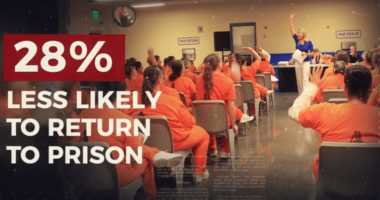Second Chances are Real — Let’s Make Sure More Students Get Them
In the past four years, my life has transformed for the better. I am a newlywed with a full-time job and working toward a bachelor’s degree in nonprofit management from Cleveland State University. I expect to graduate in the fall of 2019.
I am also formerly incarcerated. In 2001, while driving from Chicago to Cleveland with my boyfriend, I was arrested for having cocaine in the trunk of the car. This carried a mandatory minimum sentence of 14 years. I served all 14 years and was released in 2015.
During my time in prison, I took full advantage of all the educational programs that were offered. This included classes in culinary arts and communications. While I am grateful for these opportunities, and was fortunate that the credits transferred after I graduated, the course selection was limited and did not translate to a degree program or a specific in-demand job after release. In contrast, similar men’s prisons offer several program options that lead to full-time jobs like training for commercial driver’s licenses, welding, and auto mechanics. When I was released, I wanted to change this dynamic and was lucky to be referred by the warden to Lutheran Metropolitan Ministries (LMM) in Cleveland.
The Walk / TED WOMEN from Red Antelope Films on Vimeo.
Today, I am the program manager for LMM’s workforce training program called Chopping for Change (C4C), a partnership with the Ohio Department of Rehabilitation and Correction, and the Cuyahoga County Office of Re-Entry. Through C4C, eligible women who are currently incarcerated at the Northeast Reintegration Center receive culinary training and wraparound services like counseling. Under the leadership of professional chefs, participants collectively cook between 2,000 and 5,000 meals for area homeless shelters each day, in addition to participating in educational programming. They leave the training program with a culinary certificate.
In three years, 150 students have participated in the C4C program. Of the 150 participants, 90% have graduated on time and less than 3% have experienced recidivism after release. C4C is successful because education and job training are critical to providing opportunities to people in prison and preparing them for reintegrating into society. Completing C4C nearly guarantees participants are given a second chance at a stable life. One such success story is Talisha Delisle. She started at the Marble Room, an upscale steakhouse in Cleveland after graduation in 2018 and was recently promoted to head pastry chef.
In addition to easing a participant’s transition back to society and reducing the chance of reoffending, the program also gives participants something equally important: hope and confidence. Through this program I have seen women who started with a total lack of self-esteem and belief in their abilities leave with culinary skills and optimism for their personal and work futures. This can help keep women out of prison and on a path to a better life for themselves and their families.
While C4C has had great success over the past three years, we want to be able to serve more women in Northeast Ohio. Lifting the ban on Pell Grants for incarcerated students would allow our program, and other effective, quality programs like it, to grow throughout the country. We support lifting the ban through the passage of the REAL Act, and urge Congress to do so this year. Lifting the ban would ensure that thousands of women and men will gain the ability to permanently change their circumstances, for the betterment of their families and themselves.






